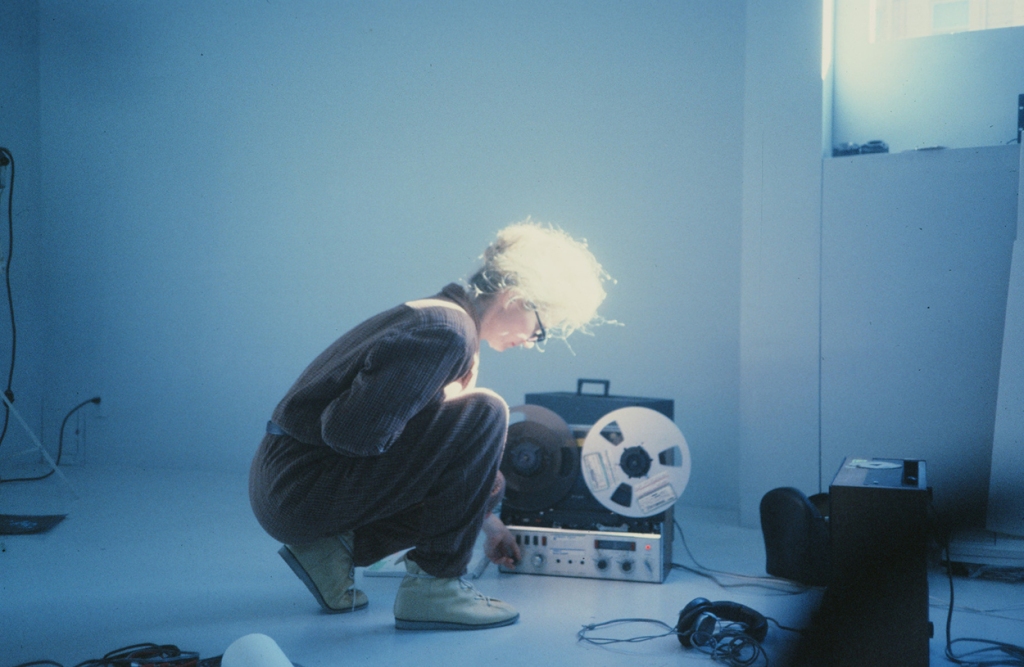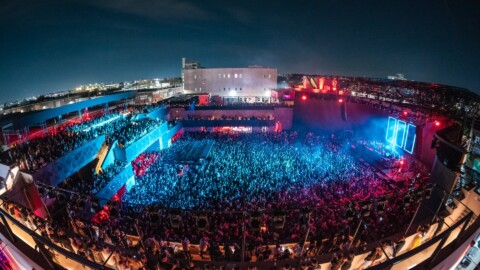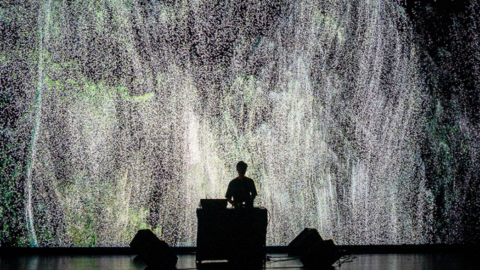By Andy Battaglia
Executive Editor, ARTnews & Art in America
The archetypal vision of the early electronic-music maker as a bespectacled midcentury man in a crisp coat and tie commandeering loads of vintage machinery is given a stiff dressing-down in Sisters with Transistors, a new eye- and ear-opening documentary about women who proved pivotal in the evolution of electronic music and sound art—related realms of history that have long been misattributed and misunderstood. The music and the minds behind it are the stars of show, and the documentary, directed by Lisa Rovner, offers a solid survey of key figures starting in the 1930s and focused mostly on the ’50s through the ’80s. But the driving force behind the film is a clear desire for a revision—or a remix, if you will—of the lineage of an art form still figuring out its past in the present.
The film opens with ravers dancing in a field before cutting to shifting sound waves visualized on an oscilloscope screen as the voice of Laurie Anderson commences poetic narration that continues throughout. “This is the story of women who hear music in their heads, of radical sounds where there was once silence, of dreams enabled by technology,” she says. Sisters with Transistors takes a captivating look at technology from the times it covers, showing how it enabled such a momentous musical movement but also, and even more so, was itself reimagined and recontextualized in the process. “Technology is an enormous liberator—it blows up power structures,” the computer-music pioneer Laurie Spiegel says early on. Later, recalling the forbidding aura around technology before she and others started subverting it in the ’60s and ’70s, Spiegel adds, “Computers back then were the enemy of the counter-culture. Computers belonged to the banks and the military and the insurance companies.”
The takeover and transformation are evidenced by vignettes on musicians and composers starting with Clara Rockmore (1911–98), a Lithuanian violin prodigy who helped transform the theremin from a strange sort of curio into an instrument fit for virtuoso feats. “You cannot play air with hammers—you have to play with butterfly wings,” Rockmore once said of her instrument, which is played not by touch but via floating human hands in proximity to two metal antennae sending frequencies into the ether.
From there, Sisters with Transistors moves on to fertile decades from the ’50s to the ’80s with a focus on Delia Derbyshire, Daphne Oram, Bebe Barron, Eliane Radigue, Pauline Oliveros, Maryanne Amacher, Wendy Carlos, and Suzanne Ciani. Rich archival footage of Derbyshire (1937–2001) and Oram (1925–2003) brings to life the otherworldly output of the BBC Radiophonic Workshop, which helped expand the collective understanding of what electronic music could do through soundtracks for radio and TV. Derbyshire traces her interest in abstract sound back to air-raid sirens and all-clear signals that surrounded her as a child during World War II, and black-and-white footage that shows her making and playing tape-loops on room-size machines it a testament just how much invention and ingenuity was required to create the sui generis sounds she wanted to hear. In old news footage, a TV show host describes the Radiophonic Workshop with an air of awe as a “music factory, where they can literally make music out of electronic sounds.”
The resistance met by women working in such a milieu is never far from mind. At one point, Oram in a vintage film reel says of her aspirations, in prim British English, “The composer wants to project something of himself”—with that pronoun punching out a palpable thud in the present day. Thinking back on her time as a young assistant for French musique-concrète pioneer Pierre Schaeffer, Eliane Radigue recounts a colleague who mentioned liking her presence because she made the studio smell nice.
The sections on Radigue, the mystically minded composer known for long meditative drones marked by measurable changes that are all but imperceptible as they transpire, rank among the documentary’s best. Speaking of electric feedback techniques that she discovered and made her own, Radique says, “By finding that sweet spot between a speaker and a microphone, you could make the sound evolve. I called these ‘sonic propositions,’ because I did not want to have to explain whether it was music or not.”
Abstraction figures even more prominently in a section on Maryanne Amacher (1938–2009), who played with psychoacoustic phenomena and multi-channel speaker systems in immersive installation works that explored the ear’s relationship to sound in space. And the political and socioeconomic dimensions behind what certain composers were doing come out in attention paid to Pauline Oliveros, who positioned her dedication to meditative “deep listening” practices as a show of resistance, and Suzanne Ciani and Laurie Spiegel, who worked in and around commercial enterprises in self-styled and self-sustaining ways.
Near the end of Sisters with Transistors, Spiegel—who worked at Bell Labs in the ’70s before developing her own software for making music on computers at home—says, “We were, in a way, trying to make a bit of a revolution. But I don’t think we would have put it in such grandiose terms.” Instead, the work that she and many others began helped engender a resounding revolution that continues to play out in its own terms still.
Sisters with Transistors premieres April 23 in the U.S. via online screenings at Metrograph and through various channels elsewhere around the world.
The World's Premier Art Magazine since 1913. Subscribe today and save up to 29%!
Sign Up for our Newsletters
Get our latest stories in the feed of your favorite networks
We want to hear from you! Send us a tip using our anonymous form.
Subscribe to our newsletters below
ARTnews is a part of Penske Media Corporation. © 2022 Art Media, LLC. All Rights Reserved.














